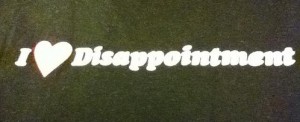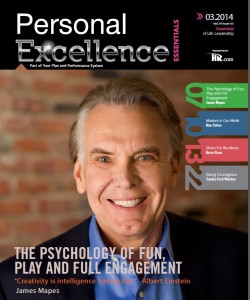In our ever faster m oving results-focused business world of communication that is sometimes reduced to 140 characters or less, it is far too easy to go for days, weeks, months or in some cases years, without pausing to notice and recognize all there is to appreciate.
From a leadership perspective it is easy to confuse social platitudes with what I'm calling “Authentic Appreciation.” For example, "Good job, Jane, you got that report out in record time," is fine and important feedback that recognizes and rewards performance. What it quite possibly overlooks is where Jane was coming from about doing the report, what sacrifices she may have made, the other team members she had to enroll to get the information she needed and a variety of other, human dimension aspects of Jane that she brought to her work.
oving results-focused business world of communication that is sometimes reduced to 140 characters or less, it is far too easy to go for days, weeks, months or in some cases years, without pausing to notice and recognize all there is to appreciate.
From a leadership perspective it is easy to confuse social platitudes with what I'm calling “Authentic Appreciation.” For example, "Good job, Jane, you got that report out in record time," is fine and important feedback that recognizes and rewards performance. What it quite possibly overlooks is where Jane was coming from about doing the report, what sacrifices she may have made, the other team members she had to enroll to get the information she needed and a variety of other, human dimension aspects of Jane that she brought to her work.
At a deeper level, people want to be appreciated for who they are, for their commitment, their heart felt passion, and most of all to feel that their lives matter. To be able to authentically speak to that requires that you slow down enough to connect and observe another's circumstances, feelings and intentions. At its best, Authentic Appreciation requires you to allow yourself a heartfelt experience of another and the desire to capture that experience in a brief and sincere declaration made to that person and perhaps to a whole team. While your acknowledgement may still be made around observed behavior, it will be generated from your deeper experience. It will carry with it your appreciation and recognition of the person as well as the behavior.
The patience Authentic Appreciation requires may also serve as an intervention in your own tendency to be caught up in the rat race, the frustrations of work life, and the never ending emails and "could have done betters."
Start with focusing on what you can appreciate about yourself, especially if that brings up your internal dialogue about your own insufficiency. If you are unwilling to Authentically Appreciate yourself, it is very unlikely you will be able to Authentically Appreciate another, your environment, or life itself. Start a list of attributes you have that are worthy of appreciation. If you find it hard, unabashedly ask others to tell you. Odds are their list will be longer than yours!
We are approaching the season of giving thanks and enjoying each other more consciously than during the rest of the year. Too often the opportunity gets wasted or, at best, underutilized in the hustle and bustle of entertaining, gift giving, and socializing. Take some time in advance of holiday events to reflect on what you Authentically Appreciate about those around you and about life itself. Write down your notes, not to read out, but to remind you.
I will close with the last words we heard from one of my most beloved clients and Vistage members, Steve Haskell. He was in the process of passing on due to illness and after he slowly looked each one of us in the eye he asked, "do you guys know how beautiful clouds are?" It was such a striking statement, and so telling that in his final days, he was noticing the amazing things in life we often overlook or take for granted.
Wishing you a happy Thanksgiving holiday and hoping you take some time to notice the clouds…
photo credit: symphony of love via photopin cc

 Disappointment can actually be a powerful tool. Whether you are disappointed in yourself, someone else, or in an outcome, investigating it more deeply can actually provide a powerful access to increasing your effectiveness and producing outcomes you might have thought were no longer possible.
Webster’s defines disappointment as “the feeling of sadness or displeasure caused by the nonfulfillment of one's hopes or expectations.” I have also heard it defined as “politically correct anger” which suggests a higher degree of intensity to the experience. In any case it is an emotional response that can shape your thoughts and behavior in unproductive ways. Viewing disappointment as a diagnostic offers a different perspective, and perhaps a different way to deal with it.
Disappointment can actually be a powerful tool. Whether you are disappointed in yourself, someone else, or in an outcome, investigating it more deeply can actually provide a powerful access to increasing your effectiveness and producing outcomes you might have thought were no longer possible.
Webster’s defines disappointment as “the feeling of sadness or displeasure caused by the nonfulfillment of one's hopes or expectations.” I have also heard it defined as “politically correct anger” which suggests a higher degree of intensity to the experience. In any case it is an emotional response that can shape your thoughts and behavior in unproductive ways. Viewing disappointment as a diagnostic offers a different perspective, and perhaps a different way to deal with it. Currently within our culture fear seems to be running rampant. Unfortunately, most of it seems to be some variation or another of the bogeyman. Fear can be empowering or debilitating to a leader. It can render you helpless to act, or worse, cause you to take really stupid actions that actually damage your situation instead of protecting you.
Substantiated fear, for example when your reptilian brain has you jump back immediately at the sight of a snake, can be very healthy. Rational fear expressed as heightened awareness based on facts showing that you are facing threats, can focus your attention, accelerate your pace, increase your team's sense of connection, and increase your odds of successfully overcoming the challenge.
Currently within our culture fear seems to be running rampant. Unfortunately, most of it seems to be some variation or another of the bogeyman. Fear can be empowering or debilitating to a leader. It can render you helpless to act, or worse, cause you to take really stupid actions that actually damage your situation instead of protecting you.
Substantiated fear, for example when your reptilian brain has you jump back immediately at the sight of a snake, can be very healthy. Rational fear expressed as heightened awareness based on facts showing that you are facing threats, can focus your attention, accelerate your pace, increase your team's sense of connection, and increase your odds of successfully overcoming the challenge. “…busy…That’s the armor everyone put on to pretend they had a purpose in the world.” -From the poem Red Brocade by Naomi Shihab Nye as quoted in the Sept./Oct. ’14 issue of Spirituality & Health
I don’t know about you, but that line landed dead center for me. I have been noticing the ever accelerating “busyness” in our clients’ lives and our own. Just because we can move faster and do more things today doesn’t mean we should or that it is good for us, those around us, or life on the planet!
“…busy…That’s the armor everyone put on to pretend they had a purpose in the world.” -From the poem Red Brocade by Naomi Shihab Nye as quoted in the Sept./Oct. ’14 issue of Spirituality & Health
I don’t know about you, but that line landed dead center for me. I have been noticing the ever accelerating “busyness” in our clients’ lives and our own. Just because we can move faster and do more things today doesn’t mean we should or that it is good for us, those around us, or life on the planet! As I write this, we are sailing a 28 mile crossing In the British Virgin Islands on a beautiful day with a steady wind and modest seas in a boat appropriately named "Escape Yourself." The length of the crossing and the steadiness of the sea conditions give me pause to consider the name of the boat assigned to us.
At first I notice the immediate ways to read/hear the name:
As I write this, we are sailing a 28 mile crossing In the British Virgin Islands on a beautiful day with a steady wind and modest seas in a boat appropriately named "Escape Yourself." The length of the crossing and the steadiness of the sea conditions give me pause to consider the name of the boat assigned to us.
At first I notice the immediate ways to read/hear the name: How many times have you heard a speaker, moderator, or meeting leader say “that’s a great question” in response to some of the questions posed by someone in the audience or a team member in a staff meeting? If you had asked an earlier question that did not elicit that reaction, did you notice what thought raced through your mind when you heard it? If you did notice, it might have sounded something like “so what am I, chopped liver?”
Although I hear it quite regularly, I have no idea why people say “that’s a great question." More than likely it is an instant, automatic, and unexamined space filler response that gives the speaker time to gather his or her response, kind of like a pause button. The problem is it pushes a judgment back on all members of the audience. and directs the audience’s attention back to the questioner, at least briefly. For the person to whom the response was directed it is an acknowledgment. To everyone else it will occur as a put down. It invites comparisons and other unproductive internal dialogue.
How many times have you heard a speaker, moderator, or meeting leader say “that’s a great question” in response to some of the questions posed by someone in the audience or a team member in a staff meeting? If you had asked an earlier question that did not elicit that reaction, did you notice what thought raced through your mind when you heard it? If you did notice, it might have sounded something like “so what am I, chopped liver?”
Although I hear it quite regularly, I have no idea why people say “that’s a great question." More than likely it is an instant, automatic, and unexamined space filler response that gives the speaker time to gather his or her response, kind of like a pause button. The problem is it pushes a judgment back on all members of the audience. and directs the audience’s attention back to the questioner, at least briefly. For the person to whom the response was directed it is an acknowledgment. To everyone else it will occur as a put down. It invites comparisons and other unproductive internal dialogue. It
It Results-oriented leaders, particularly in our culture, are often driven by their own needs and wants. However, real power comes from providing the leadership that results from shared vision and shared focus.
A case in point, one of our clients was recently promoted to CEO. She has been asking how she can get her colleagues to want to work for her so she can lead the company to achieving its exciting vision. Suzanne, one of 2130’s co-founders, pointed out that the answer to her question is very unlikely to give her much access to the outcomes she is seeking. A much higher leverage conversation deals with focusing on enrolling everyone in focusing on the shared vision and unleashing their own creativity and self-generated accountability to fulfill the shared vision together.
Results-oriented leaders, particularly in our culture, are often driven by their own needs and wants. However, real power comes from providing the leadership that results from shared vision and shared focus.
A case in point, one of our clients was recently promoted to CEO. She has been asking how she can get her colleagues to want to work for her so she can lead the company to achieving its exciting vision. Suzanne, one of 2130’s co-founders, pointed out that the answer to her question is very unlikely to give her much access to the outcomes she is seeking. A much higher leverage conversation deals with focusing on enrolling everyone in focusing on the shared vision and unleashing their own creativity and self-generated accountability to fulfill the shared vision together. Have you ever noticed that your mind is chock full of running monologues that are instant, automatic, and largely unexamined? These “thoughts”arise from what we refer to as your “Mental File Cabinet” and require no effort on your part to occur. They are patterns of thinking that started forming when you were very young and now run on auto-pilot.
The problem is, if you haven’t learned to self-observe, these thoughts will function as very unintended biases to both your listening and your speaking. These biases will very likely give you the outcomes that currently frustrate you, or even create upsets in others.
Have you ever noticed that your mind is chock full of running monologues that are instant, automatic, and largely unexamined? These “thoughts”arise from what we refer to as your “Mental File Cabinet” and require no effort on your part to occur. They are patterns of thinking that started forming when you were very young and now run on auto-pilot.
The problem is, if you haven’t learned to self-observe, these thoughts will function as very unintended biases to both your listening and your speaking. These biases will very likely give you the outcomes that currently frustrate you, or even create upsets in others. One of the most common challenges I see among leaders is unwillingness to have difficult conversations. It is a very common issue for leaders to be unable to be direct with others about failures to perform and their roles in problems. I seldom see swift, effective feedback that communicates disappointment with another person's behavior. The trouble is, none of us grow without pain.
The thing is, people are far more resilient than it seems. In fact, people aspiring to leadership will actively seek direct feedback, even if it hurts. I don't have specific data about exactly what stops leaders from being direct, but after working with them for so many years my observation is that the issue is more about fear of being rejected, abandoned, or simply not knowing how to proceed that stops leaders from being as direct as they could be.
One of the most common challenges I see among leaders is unwillingness to have difficult conversations. It is a very common issue for leaders to be unable to be direct with others about failures to perform and their roles in problems. I seldom see swift, effective feedback that communicates disappointment with another person's behavior. The trouble is, none of us grow without pain.
The thing is, people are far more resilient than it seems. In fact, people aspiring to leadership will actively seek direct feedback, even if it hurts. I don't have specific data about exactly what stops leaders from being direct, but after working with them for so many years my observation is that the issue is more about fear of being rejected, abandoned, or simply not knowing how to proceed that stops leaders from being as direct as they could be. John Dewey said that “a problem well-stated is a problem half-solved.” My correlate to that is "a problem mis-named is a problem stuck!"
John Dewey said that “a problem well-stated is a problem half-solved.” My correlate to that is "a problem mis-named is a problem stuck!" As discussed in my recent blog series, all you really have to effect your leadership is your thinking, listening and speaking. An essential ingredient of growing yourself and your leadership is gaining self-awareness and the ability to self-observe and intervene while you are in the heat of the action. If you can’t self-observe, you can’t hear/see how you are thinking and communicating, and whether you are even connecting at all.If you can't self-observe, you will be unable to give yourself a new brain assignment that self-corrects your instant, automatic and largely unexamined reactions.
In our work, we invite clients to consider their brain as a “Mental File Cabinet”which stores every experience from every one of our five senses at every moment. The catch in that is that you have all sorts of filters, biases, and predispositions that severely limit what gets into your Mental File Cabinet. Further, your Mental File Cabinet has strange and unique filing procedures and cross-referencing.
As discussed in my recent blog series, all you really have to effect your leadership is your thinking, listening and speaking. An essential ingredient of growing yourself and your leadership is gaining self-awareness and the ability to self-observe and intervene while you are in the heat of the action. If you can’t self-observe, you can’t hear/see how you are thinking and communicating, and whether you are even connecting at all.If you can't self-observe, you will be unable to give yourself a new brain assignment that self-corrects your instant, automatic and largely unexamined reactions.
In our work, we invite clients to consider their brain as a “Mental File Cabinet”which stores every experience from every one of our five senses at every moment. The catch in that is that you have all sorts of filters, biases, and predispositions that severely limit what gets into your Mental File Cabinet. Further, your Mental File Cabinet has strange and unique filing procedures and cross-referencing. It seems to me that the bulk of what passes for leadership development currently is actually training to improve your ability to be someone else. By that I mean training to fit yourself into what the world seems to want. The issue isn’t confined to just leadership training. Reading resumes has become almost worthless because counselors have taught most people to write them in a way that claims credit for all sorts of spectacular results and uses lots of key words that show up in headhunter searches.
Author, speaker and workshop leader David Whyte offers the following perspective: “…human beings have never had the luxury of choosing between an untouched and interior foundational self and the necessities and often overwhelming revelations of the outer world.”
It seems to me that the bulk of what passes for leadership development currently is actually training to improve your ability to be someone else. By that I mean training to fit yourself into what the world seems to want. The issue isn’t confined to just leadership training. Reading resumes has become almost worthless because counselors have taught most people to write them in a way that claims credit for all sorts of spectacular results and uses lots of key words that show up in headhunter searches.
Author, speaker and workshop leader David Whyte offers the following perspective: “…human beings have never had the luxury of choosing between an untouched and interior foundational self and the necessities and often overwhelming revelations of the outer world.” David Whyte asks the beautiful question, “what if that story I have been telling myself is not true anymore?”Complementary to that question, I often reflect on what’s available in my life as a result of having given up old stories, most of which had me as a victim at the center at the time I told the story the first time.
My wife Suzanne and I recently had the extraordinary opportunity to experience a marvelous “payoff”from having given up our various stories about the people we were previously married to, the events around the end of those marriages, and the other people who were involved in various ways at the time.
David Whyte asks the beautiful question, “what if that story I have been telling myself is not true anymore?”Complementary to that question, I often reflect on what’s available in my life as a result of having given up old stories, most of which had me as a victim at the center at the time I told the story the first time.
My wife Suzanne and I recently had the extraordinary opportunity to experience a marvelous “payoff”from having given up our various stories about the people we were previously married to, the events around the end of those marriages, and the other people who were involved in various ways at the time. Effective leadership requires intentional
Effective leadership requires intentional  Last week
Last week In developing your leadership effectiveness you really only have 3 areas to impact - your thinking, your listening and your speaking. Since your thoughts shape your speaking and listening, that is your key leverage point, so let’s start there.
Two recent events have reminded me of how completely our thoughts dominate and shape our experience and that, in turn, controls our leadership and relationship effectiveness. Before getting to the events let’s set some context. When delving into the arena of thoughts we like to talk about it by saying that each of us has what amounts to a Mental File Cabinet. Several characteristics of the ‘Mental File Cabinet” are:
In developing your leadership effectiveness you really only have 3 areas to impact - your thinking, your listening and your speaking. Since your thoughts shape your speaking and listening, that is your key leverage point, so let’s start there.
Two recent events have reminded me of how completely our thoughts dominate and shape our experience and that, in turn, controls our leadership and relationship effectiveness. Before getting to the events let’s set some context. When delving into the arena of thoughts we like to talk about it by saying that each of us has what amounts to a Mental File Cabinet. Several characteristics of the ‘Mental File Cabinet” are:
 Leadership and the qualities of good leaders are often debated and there is no single definition on which everyone seems to agree. Let’s narrow the focus to the role of the CEO.
We really like our colleague
Leadership and the qualities of good leaders are often debated and there is no single definition on which everyone seems to agree. Let’s narrow the focus to the role of the CEO.
We really like our colleague  Traditionally, high value has been placed on splitting or compartmentalizing “personal life” and work. There has been pressure in the workplace to behave rationally, productively and with focus – day in and day out. The message has been to shut out personal circumstances, emotions, and life experiences and be task and accomplishment oriented. For leaders, the expectation has been to be driven and a driving force for others, relentlessly pushing the business and the team forward.
Within this framework there has been no room for emotions, emotional energy, and in some ways real humanity. This has been part of the gender divide in the work place – for many years women were considered too emotional to be leaders.
Traditionally, high value has been placed on splitting or compartmentalizing “personal life” and work. There has been pressure in the workplace to behave rationally, productively and with focus – day in and day out. The message has been to shut out personal circumstances, emotions, and life experiences and be task and accomplishment oriented. For leaders, the expectation has been to be driven and a driving force for others, relentlessly pushing the business and the team forward.
Within this framework there has been no room for emotions, emotional energy, and in some ways real humanity. This has been part of the gender divide in the work place – for many years women were considered too emotional to be leaders.